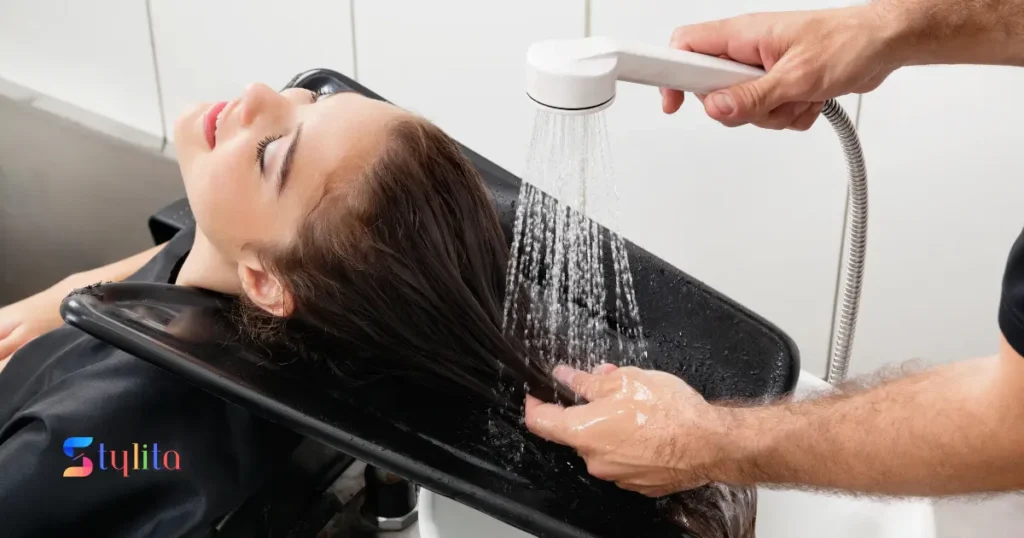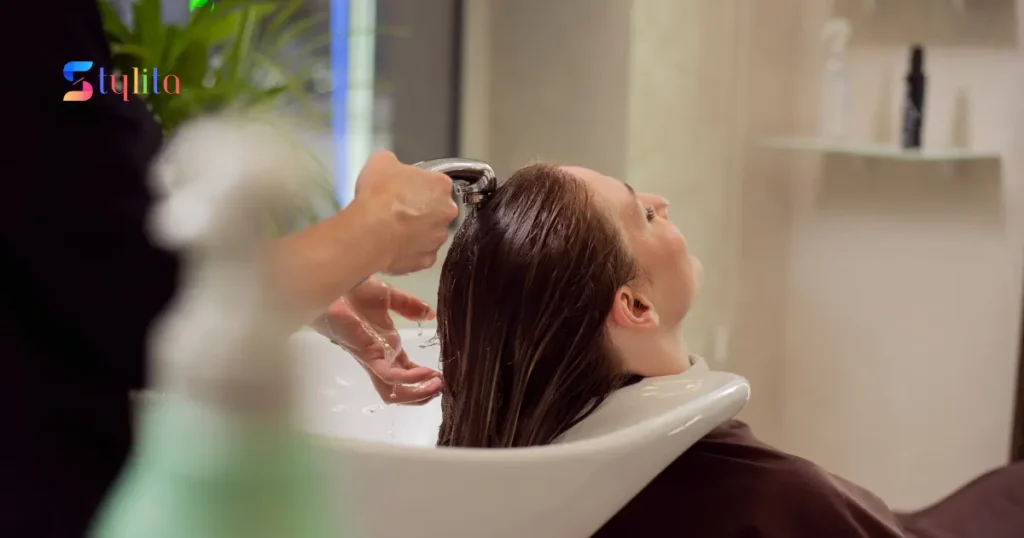Everyone has their own unique rituals and routines when it comes to hair care. It’s a deeply personal aspect of our lives. Imagine this: What if I told you that there’s a new trend emerging where people are ditching shampoo from their daily routine? This method, known as ‘water-only washing,’ has been getting a lot of attention lately as a possible sustainable and healthy option for hair care.
So, is the water-only hair-washing trend truly as harmful as people claim, or could it potentially be an affordable method to achieve beautiful hair? Let’s dive into the water-only hair-washing trend and separate fact from fiction. We’ll discuss if it truly leads to natural hair bliss or if it can make your hair oily.
Jump To Section
Secret Behind Water-Only Hair Washing

When it comes to washing our hair with water, there’s more to it than just getting it wet. Water has a pretty interesting impact on our hair and scalp, which can really affect how they look and feel.
Our scalp naturally produces oils called sebum that help keep our hair moisturized and protected. When we wash our hair with water, the oils in it interact with the water molecules. This interaction forms a protective layer that shields our hair from drying out and sustaining damage.
Water-only washing doesn’t actually strip away all the natural oils from our scalp, despite what many people believe. Instead, it helps to regulate oil production, which keeps the scalp balanced and healthy. It’s really important to have this natural balance in order to keep your hair strong and shiny.
Water-only washing can have a positive impact on hair follicles. It helps improve blood circulation to the scalp, which is beneficial for overall hair health. When blood flow to the scalp improves, it helps provide the necessary nutrients to the hair follicles. This can lead to healthier hair growth and potentially lower the chances of experiencing hair loss.
One important thing about water-only hair washing is that it helps keep the scalp’s pH balance in check. Having a balanced pH level is really important if you want to keep your scalp healthy and avoid issues like dryness, itchiness, and dandruff.
Benefits of Water-Only Hair Washing

Adopting a water-only hair-washing routine has quite a few benefits, including improving your hair’s health and well-being.
Traditional shampoos often have harsh chemicals such as sulfates and parabens that can strip away natural oils and damage the hair shaft. Use products that are gentler on the hair to avoid this. When you wash only with water, you avoid coming into contact with harmful chemicals, resulting in healthier hair that is less likely to break.
Water-only washing helps your scalp’s natural oils flourish, giving your hair the nourishment and protection it needs. Preserving the natural oils allows your hair to retain moisture effectively, making it softer and easier to manage.
Switching to a water-only hair-washing routine can actually help you save some cash in the long run. Not only that, but it also has some positive environmental benefits to consider. Moreover, it helps with environmental sustainability by decreasing the use of plastic bottles and products filled with harmful chemicals that damage the planet.
Your hair’s texture and appearance can actually improve over time with water-only washing. It can restore your hair’s natural shine, reduce frizz, and improve its overall health, resulting in hair that looks and feels amazing.
Water-only washing can help improve scalp health by addressing common issues such as dryness, itchiness, and flakiness. It achieves this by maintaining a natural balance of oils and creating a healthier environment for the scalp.
Drawbacks of Washing Hair with Water Only
There are a few challenges and drawbacks to consider when washing your hair with just water. Let’s go over a few important things to keep in mind:
At the beginning of water-only washing, you might notice that your hair feels a bit greasy. That’s because your scalp is accustomed to regular shampoo, which tends to remove oils. As time goes on, your scalp will adapt, but this adjustment period can be a bit difficult.
Removing buildup can be a bit more challenging when using shampoo without cleansing agents. This is especially true for products like gels, serums, and oils. Perhaps you could try exploring different approaches or adjusting the amount of product you use to avoid too much buildup.
Water-only washing may have an impact on your hair’s texture and manageability, depending on your hair type. People have different experiences with their hair. Some notice that it becomes softer and easier to manage, while others may see changes in volume and texture.
Keeping things clean can be a bit tricky. Water can do a good job of getting rid of some dirt and grime, but it might not always leave you feeling totally fresh. It may be worth considering other cleansing methods, such as gentle cleansers, or trying natural remedies like rinsing with apple cider vinegar from time to time.
Tips for Water-Only Washing
Switching to a water-only hair-washing routine requires time and a proper method. Here are a few suggestions that might make your transition easier:
Hey, have you ever thought about trying out some natural cleansing methods? One idea is to include diluted apple cider vinegar as a rinse in your routine. It can be a great way to cleanse your hair or skin without using harsh chemicals. It’s great for getting rid of buildup and restoring the pH balance of your scalp.
Getting a scalp massage can do wonders for your scalp and hair. It helps improve blood circulation and spreads natural oils, which leads to a healthier scalp and hair.
It’s important to stay hydrated by drinking lots of water and eating a well-balanced diet with plenty of vitamins and minerals. This will help keep your scalp healthy and regulate oil production.
Just be patient with the transition process. Just give it a few weeks and your scalp will adjust to water-only washing. Don’t worry if you notice some greasiness at first; it’s totally normal.
Effect of Water-Only Washing on Different Hair Types
Washing your hair with only water can have different effects on various hair types, bringing both challenges and benefits that are specific to each type.
Curly Hair
Curly hair has a tendency to be on the drier side, so using water-only washing can be really helpful in keeping those natural oils locked in. This method helps to increase moisture levels, which can result in healthier curls with better definition and less frizz.
Straight Hair
So, I wanted to talk about straight hair. It’s something that a lot of people have, and it’s pretty common. I think it’s interesting how some people are born with naturally straight hair, while others have to use heat tools or chemical treatments to achieve that sleek look. Straight hair can be
When you start washing your straight hair with just water, you might notice some greasiness at first. This is because your scalp needs time to regulate its oil production. With regular practice, the scalp can naturally regulate oil secretion, resulting in a more balanced look and reducing the need for frequent washing.
Thick Hair
If you have thick hair, you might find that water-only washing is a great option. It helps to keep your natural oils intact without making your hair feel heavy. Scalp massages during washing can help distribute oils evenly, making your hair softer and easier to manage.
Thin Hair
Having thin hair can sometimes be a challenge. It may require some extra care and attention to keep it looking its best. But don’t worry; there are plenty of tips and tricks to help you achieve the hairstyle you desire. You can add volume to your hair by using volumizing products and experimenting with different hairstyles.
Thin hair can be a bit of a challenge when it comes to water-only washing. The buildup of excess oil can give it a greasy appearance. It’s important to cleanse your scalp properly and use natural clarifying agents, such as apple cider vinegar, to reduce greasiness and maintain hair volume.
Help with Specific Scalp Conditions
Using only water to wash your hair can be really beneficial for your scalp. It can help with certain scalp conditions, provide relief, and even improve your overall hair health.
Using only water to wash your hair can be helpful for those who have dandruff, as it reduces the need for harsh chemicals that can make flakiness worse. You can try giving yourself regular scalp massages and gently exfoliating your scalp to help with dandruff symptoms and keep your scalp moisturized.
Water-only washing may not be a complete solution for treating psoriasis, but it can be a helpful addition to medical treatments. It can help reduce scalp irritation and promote a healthier scalp environment. You might find it helpful to try incorporating natural remedies such as tea tree oil or aloe vera to provide some relief for your psoriasis symptoms.
Water-only washing is great for tackling common scalp issues like itchiness and dryness. You might find that using herbal rinses or diluted essential oil blends can help soothe your scalp and keep it healthy.
Hair Washing Alternatives
In addition to washing with just water, there are a few other natural cleansing methods that can effectively clean your hair without using harsh chemicals.
Using a mixture of baking soda and water every now and then can help clarify your hair and scalp by getting rid of buildup and impurities.
You can make herbal rinses by infusing herbs like rosemary, lavender, and chamomile into water. These rinses are great for soothing and refreshing your hair, while also promoting scalp health and giving your hair a natural fragrance.
Clay masks or mud treatments are great for deeply cleansing the scalp and hair. They can absorb excess oil and impurities without stripping away the natural oils.
When you take the time to learn about the science behind washing your hair with just water, you can make better decisions for the health of your hair and scalp. Trying out different techniques can help you discover what works well for your hair type and what you personally prefer.
Conclusion
In essence, transitioning from shampoo bottles to water-only hair washing is a deeply personal journey. Initial challenges, like greasiness, are temporary, paving the way for benefits like preserved natural oils and enhanced texture. Patience, the key to any hair care routine, opens the door to transformative experiences.



